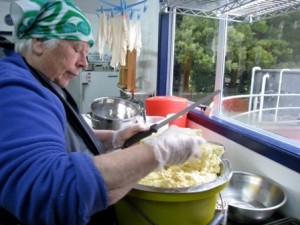I write in some distress as it appears MPI is determined to close me down with their excessive demands for repeat testing of raw milk, immature cheese curd and final product testing of Cwmglyn mature raw hard cheese.
My validation protocol has been complied with and all cheese was acceptable and way, way below their tolerance limits and released for public sale. As the cost of testing for this validation study was in excess of $15,000.00, (for 10 cheese truckles) I had thought that on-going routine testing would be at a level that would be sensible (in terms of the food safety risk), cost effective and affordable for me. But no, apparently the dairy team at the Ministry of Primary Industries want to test me into extinction.
It is possible that they do not understand the different food safety risk between raw milk and raw milk hard cheese. Fortunately as a member of the UK Specialist Cheesemakers Association I have access to their extensive technical literature, in particular an article by Paul Thomas on “The Anti-Microbial components of milk –Lactoperoxidase and associated systems”.
Lactoperoxidase is particularly well developed in cows, probably because their design and tendency to make fairly liquid manure makes it sensible to have a system to protect the calves while they suckle. This inhibitory action is 30 times more active in cows than other mammals and is stronger the ‘newer’ the milk is and is very effective in destroying the functionality of pathogenic material. This inhibitory effect is, of course, destroyed utterly by heat treatment of the milk.
I have 4 healthy, contented Jersey cows. All their milk is used to make the well known Cwmglyn Farmhouse Cheese. The chefs at Government House always buy it when they have Royal Visitors on State visits. It is also served at top Wellington restaurants and elsewhere.
I am required to have my milk laboratory tested daily for bactoscan, coliforms, listeria, coagulase positive staphylococcus, weekly for Somatic Cell Counts (we routinely do a daily check on each cow on every quarter with a Rapid Mastitis Test in the milking parlour). Then I am required to test the immature curd for each cheese I make for E.Coli and Coagulase positive Staphylococcus. When the cheese is finally mature at 90 days, I again have to have the cheese laboratory tested for E.coli, coagulase positive staphylococcus, salmonella, Listeria, salt and moisture.
The only dispensation given, is that they have agreed that I only have to final product test every 5th cheese I make. The tolerance limit for coagulase positive staphylococcus is 1000 cfu/g and my highest reading on one cheese was 78 with another at 30 –all the others were less than 10! For E.coli the tolerance limit is less than 100 and my highest reading in 71 cheese batches was one at 2 –all the others were less than 1.
No other pathogens have ever been detected.
My laboratory testing costs in December 2016 were $4,053.39. I sold $5,290.43 worth of cheese and had no more to sell.
Lest you think the difference was enough for a geriatric cheesemaker, the wages we pay our excellent part-time worker (who prior to working for me for the last 7 years was 15 years on a benefit) was $1,549.76. She looks after our customers while I am busy in the cheeseroom. Hardly a sustainable business for us as we still have to fund dairy cleaning products, feed for the cows, power, rates insurance etc.
I do realise that the staff at the laboratories have mortgages and children to educate and they must be thrilled that government legislation is making it possible for them to do this. Were my test results to show that my milk, curd and cheese was constantly contaminated, naturally I would expect such a heavy level of testing, but it doesn’t. My results are consistently stunningly good.
I am retailing my cheese at $80 a kilo, which seems to me excessive for what is actually a simple peasant food, but even at this level, I can’t make any sort of profit and am forced to try and sell my remaining assets to pay for this huge compliance cost. Fonterra’s batch sizes consists of thousands of cheeses, my batch is usually a single cheese, yet I have to pay the same compliance cost –although of course Fonterra wouldn’t dare make raw cheese!
I make good cheese, and have enough HACCP and Risk Management Documentation to paper a palace. My MPI raw cheese audit in November found no non compliances. I am happy to supply whatever proof you need of my test results.
Tourists, especially overseas ones, cannot understand why, in the biggest dairy country in the world, government legislation is designed to make it impossible for small boutique cheese producers like myself to survive economically. Why is this?
I have a feeling that there would probably be less compliance costs were I to start making explosives for sale rather than cheese.
Please help me.
Biddy Fraser-Davies,
Cwmglyn Raw Farmhouse Cheese
Eketahuna


